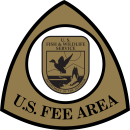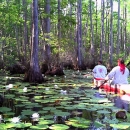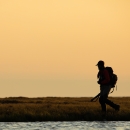Visit Us
National wildlife refuges offer us all a chance to unplug from the stresses of daily life and reconnect with our natural surroundings. DeSoto National Wildlife Refuge offers visitors a chance to explore the unique Missouri River floodplain habitat. After years of alteration to this river system, the refuge provides a glimpse into the historical floodplain habitat and the wildlife that depend on it.
Location and Contact Information
About Us
DeSoto National Wildlife Refuge is located along the Missouri River and borders both Iowa and Nebraska. Within its 8,365 acres lies DeSoto Lake, an oxbow lake that used to be a bend in the Missouri River. The refuge contains bottomland forests, tall grass prairie and wetland habitats that are managed to mimic the natural Missouri River floodplain habitat to benefit a diversity of migratory birds that flock to the refuge each year in the spring and fall. The refuge also contains a piece of history within its borders, the Bertrand Steamboat. The Bertrand sunk on previous riverbend leaving behind the cargo and historic time pieces, amounting to almost 250,000 different artifacts housed within the walls of the DeSoto National Wildlife Refuge Visitor Center. DeSoto National Wildlife Refuge is truly a place where wildlife meets history!
Our Species
DeSoto National Wildlife Refuge acts as a rest stop for birds. Thousands of birds migrating along the Missouri River corridor utilize the refuge as a sanctuary and resting place as birds make their migration journey in the spring and fall. The refuge is best known for the big flocks of migratory waterfowl utilizing the refuge wetlands and lakes. Along with the waterfowl, bald eagles will congregate on the refuge. Songbirds are also abundant later in the spring and during the summer months. The bottomland forests, grasslands and wetlands provide a diverse mosaic of habitat that benefit more than 100 species of birds including dickcissels, orioles, yellow-headed blackbirds, red-headed woodpeckers, yellow warblers and common yellowthroats.
Projects and Research
Our National Wildlife Refuges are places for everyone to learn about and discover the outdoors. This opportunity is utilized by numerous local grad students from local universities and other government organizations over the years, researching parts the wide variety of wildlife and plant species that use or call DeSoto National Wildlife Refuge their home. If interested in performing a research project on refuge lands please contact:
Besides just grad student research, DeSoto National Wildlife Refuge also utilizes citizen science projects to help improve our understanding of the natural world, enabling us to evaluate our management practices for our wildlife.








